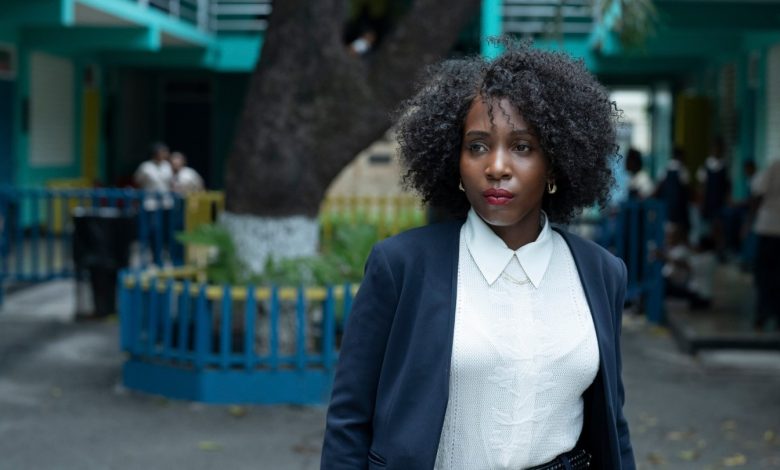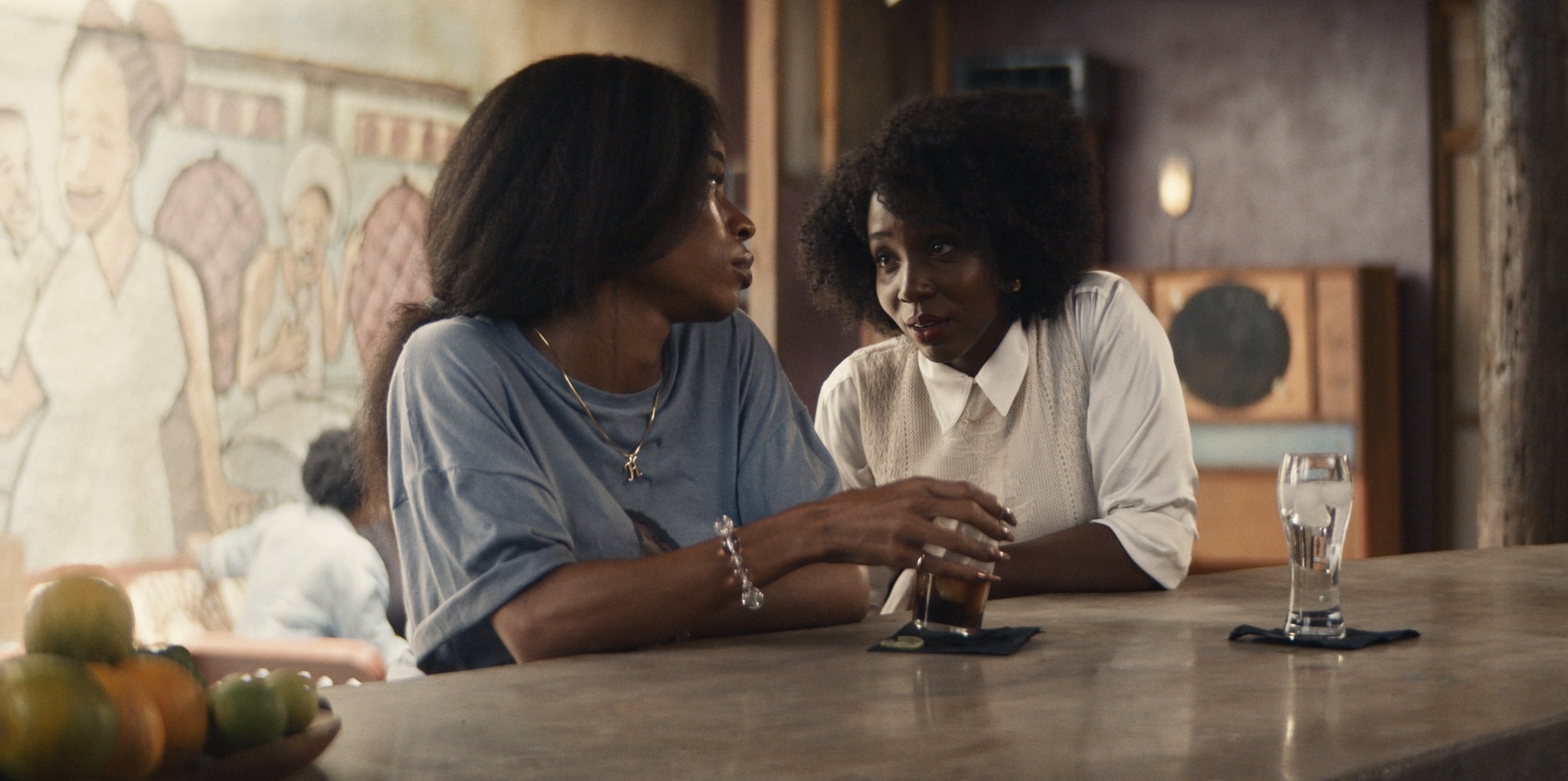‘Get Millie Black’ Is Not Your Typical Detective Show

Millie-Jean Black is not TV’s typical leading detective. She’s not male. She’s not white. And she’s not pursuing cases in New York City or London.
Instead, it’s Kingston. And over the five-episode limited series Get Millie Black, a joint production from HBO and the U.K.’s Channel 4 Television, both her life and Jamaica, the country of her birth and lineage, unfold on screen in ways previously shielded from the outside.
Created and executive produced by novelist Marlon James, who won the prestigious Man Booker Prize for his 2014 novel A Brief History of Seven Killings, a first for a Jamaican-born writer, Get Millie Black is not content with just solving crimes. Instead, the series strives to show both why Millie is compelled to solve crimes and why those crimes need to be solved in the first place.
So while the official logline reads, “Ex-Scotland Yard detective Millie-Jean Black returns to Kingston to work missing persons cases, soon finding herself on a quest to save a sibling who won’t be saved, to find a child who can’t be found, to solve a case that will blow her world apart and prove almost as tough to crack as Millie Black,” the series, which alternates voices and perspectives each episode, beginning with Millie Black, is much more than what it appears.
“It’s a really powerful project and a very poignant experience for me, as a British Jamaican actress, to be able to embody this character with all of her nooks and crannies and cracks and layers, but also, ultimately, to platform a story that is a conversation between Britain and Jamaica around colonial legacy through a character who is so anti-colonial and who really fights to expose the legacy of the slave trade by revealing the ways in which it is still very much at play today,” Tamara Lawrance, who plays Millie Black, tells The Hollywood Reporter.
When Motives CEO and former Channel 4 executive Simon Maxwell, who produces the series, broached the idea of James creating his own TV show, it wasn’t anything James had previously considered. But once he began exploring the opportunity seriously, he found the detective genre to be a natural fit. “I already look at writing as a form of detective work. So it was kind of inevitable that I’d end up writing about a detective — and my mom is a detective, which means she’s going to take credit for this show,” he smirks.
In a letter sent to the press prior to the show’s release, James wrote of his mother and her influence on the series more extensively. “Before there was Millie Black, there was Detective Inspector Shirley Dillon-James, blazing a trail where there was none, and making her name by reading clues, not about what happened, but what was going to happen,” he wrote. “My mother became famous for using book and street smarts to stop crime before it occurred by picking up on those clues that made it inevitable. You could spend most of your life figuring out such a person, and I failed while trying — but I did find inspiration for our lead.”
That inspiration differs greatly from the “Feel Alright” commercials with “One Love” from the iconic Bob Marley playing in the background set against beautiful beaches and the smiles of satisfied tourists. Instead, the Jamaica in which Millie Black works has a very dark side that lays bare the country’s homophobia and transphobia, while also exposing the crippling poverty for some that breeds desperation Lawrance rightfully ties to both slavery and colonialism.
“Sometimes the problem is that we start to expect [simplicity] from quote-unquote, Third World entertainment, whether it’s sort of simple or slapstick, and everybody drinks a beer and goes off into the sunset or so on, and the problem with that is it creates the impression that sort of deeply, complicated art can’t come from these stories. And that’s just not true at all,” James says of shows and films not from the U.K. or the U.S. “If I’m going to tell a story about Jamaica, it’s going to be complicated and, as the character [Millie] says in the first episode, it probably won’t add up.”
Get Millie Black is deeply complicated. Growing up, Millie’s abusive mother was determined to break the bond she had with her brother Orville. One day, when Millie stepped in to defend Orville from their mother’s physical attacks over his sexuality, she sent Millie to England. Miles away, she denied Millie communication with Orville, and even informed her of his death, pronouncing him in hell, not heaven. Yet when their mother passed, Millie found out Orville had not died. That she never found him alive, however, haunts her still. Then there is the strained relationship she has with her trans sister Hibiscus (Chyna McQueen).

Of course, there are Jamaicans who don’t agree with presenting a story of their island featuring an abusive mother with a spotlight on the country’s poverty and anti-queerness on such prestigious platforms. But that kind of criticism and disapproval does not deter James, who is also well aware of the many stereotypes film and TV present of his island as being full of dreadlocked weed smokers and worse. Because James has always taken his portraits of his country very seriously, the bigger picture he frames in his novels carries over to his first TV series.
“I think portraits of Jamaica that are 100 percent negative are just as bad as portraits that are 100 percent positive. Neither is very realistic. A pretty caricature of Jamaica or a horrible caricature of Jamaica is still a caricature,” he explains. “I keep trying to write small novels, but Jamaica is just too big. And it’s complicated. It’s never one thing. If you’re going to take on any form of art that’s trying to capture even just a piece of Jamaica, you end up trying to capture all of it. I think you have to do the good and the bad and the impressive and the not so impressive, and the light and the dark and the complicated stuff we can’t really figure out. As a writer, I think the best relationship you can have with any subject is being deeply complicated.”
And Millie is deeply complicated. Losing Orville and not growing up with Hibiscus fuels Millie to be there for others. But the problem is, she doesn’t quite know how. For anyone who doesn’t know Millie, her fondness for her police partner Curtis (Gershwyn Eustache Jnr) would be barely discernible. We see emotionally unavailable men in this line of work all the time. But here, Millie is frequently called out for it. The sexism prevalent in Jamaica and the world at large was front of mind as James began crafting the show.
“One of the things that I was driven by when I was writing is the idea that a male character can be complicated. A male character can do horrible things and still be the protagonist. The male character can be, ‘he’s great, but he betrayed his wife,’ and we’re still supposed to follow him in the story. But when women do it, it’s sort of an unforgivable thing. People always say, ‘Well, I can’t see beyond that.’ And I really wanted to challenge that [with] some of the situations Millie ends up in,” he explains. “[There is this] idea that there is still this way in which a woman, a female character, should behave, whereas there is no ‘should’ with a male character.”
Recalling a comment James made in one of the many discussions of the show prior to its release, Lawrance says of Millie, “she is very flawed, but she does things that we see male characters do a lot, but there’s more of an assumption, or a kind of an acceptance of the sort of fallibility, or more room for nuance from male detectives, because we also see them as people who should take dominion and do whatever they need to do to get ahead.
“But for Millie being a woman, I think there is a universal belief, a socialization that she should behave in certain ways, and that she should be more caring, more maternal, more sensitive, more understanding, more compassionate. And she isn’t because she’s on her boss tip, and she needs to get the work done. So that means being ruthless when she needs to be. And I think ruthlessness, and at times recklessness, is a veneer to what is actually a deep sense of [the] something loving and ultimately very brave about Millie, and she just believes in righteousness, essentially, and that just things should come to fruition. And so if she sniffs anything being unjust, she’s not having a bar of it. And whereas a lot of the time there is corruption in these institutions that Millie is in where people will turn a blind eye to injustices, but she doesn’t. So I hope that people can also see how well meaning she is in light of all of the sort of questionable decisions that she makes.”
In some ways, Millie’s relationship with Hibiscus, whom she calls Bis, is pivotal in exposing what Lawrance observes as “brave” and “loving” about Millie. To that end, Chyna McQuenn, in her first-ever role, brings a nuance to Hibiscus that helps shine a greater light on Millie. McQueen’s performance and interactions with Lawrance’s Millie uncover the cruelty of growing up unloved and unwanted that includes Millie, though Hibiscus grew up an outcast in her own home and lives as one presently in her country because she is a trans woman. McQueen’s approach to her character, as she shared during a cast press conference, was just “to be myself authentically. Just be natural.”
That natural approach is there in James’ writing and extends to Curtis and his guy Daniel (Chyna McQueen) as well. “It’s amazing that we get to empathize with Hibiscus, a character that we’ve never seen before on screen, and get an episode through which we hear her story and get to understand her lens and her experiences,” says Lawrance who adds that it’s “so beautiful that Marlon centered not only Hibiscus but also Daniel and Curtis’ queer romantic relationship. Seeing that kind of healthy and supportive love also humanizes. Some people have really archaic and ignorant ideas about what it is to be queer or in a queer relationship or what love means between two people of the same sex or gender. I think the beauty of Get Millie Black is that it is a character-led drama in which we see all those scenes play out in interpersonal relationships.
“I’m really glad that this show is in a platform [that] not only [shows] the struggles and the violence and the homophobia and the transphobia that still exists in Jamaica, but also the resilience, the community, the unity, and the love that also exists,” adds Lawrance.
Creating multiple narratives of his first country is paramount to James as an artist, and that’s what he’s extended to his latest format. “There’s no one story about Jamaica. There’s no one story about Millie,” James says of his series. “I think storytelling should be difficult. It should be a challenge or else it’s not worth doing.”
***
Get Millie Black premiered Nov. 25, with new episodes airing Mondays on HBO at 9 p.m. and streaming on Max.
Source: Hollywoodreporter
Related Posts
- Roundball Rocked: With NBA Return Looming, NBC Purges Scripted Roster
- SoundCloud Says It “Has Never Used Artist Content to Train AI Models” After Backlash on Terms of Service Change
- Fox News’ Camryn Kinsey Is “Doing Well” After Fainting on Live TV
- Kerry Washington and Jahleel Kamera in 'Shadow Force.'
Courtesy of Lionsgate
…
- This Alternative Artist Landed a Top-20 Chart Debut With an Album Made Almost Entirely on His Phone





